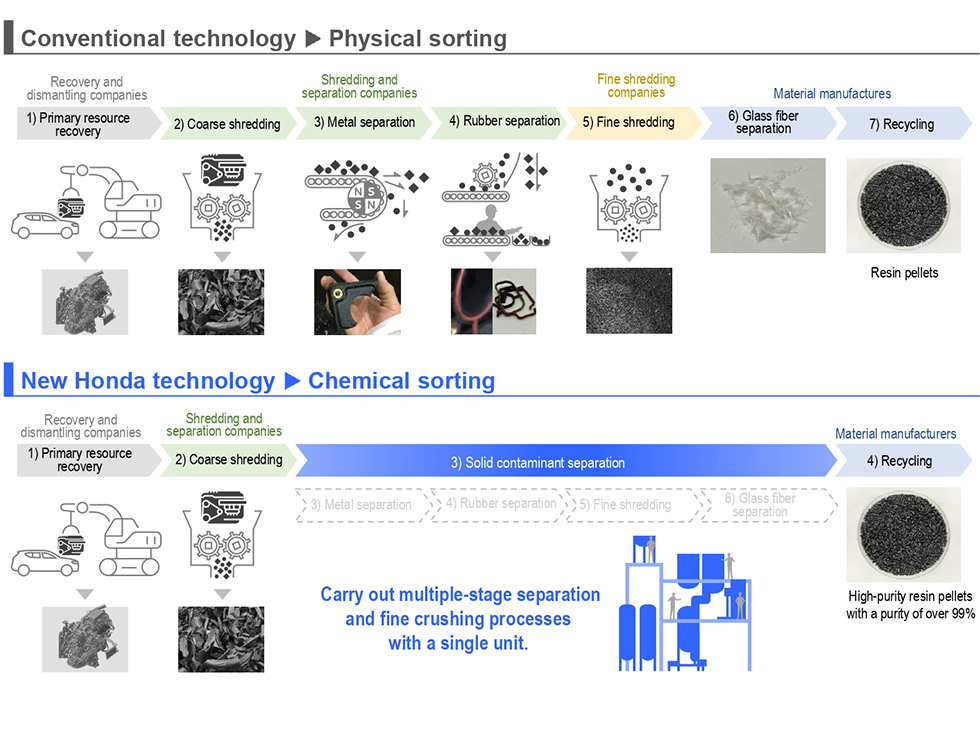TOKYO, Japan, September 16, 2025 - (JCN Newswire) – Honda R&D Co., Ltd. (Honda) today announced that it has developed a new “chemical sorting” technology, which sorts and extracts reusable plastics from waste plastic parts that contain solid contaminants unique to automotive waste. Honda will build a pilot facility with a maximum processing capacity of 350 tons per year and verify the technology by the end of 2026, striving to put it into practical use by around 2029.
The solid contaminant separation technology newly developed by Honda uses chemical sorting, that dissolves the resin in a solvent to remove solid contaminants and extract high-purity resin. Waste automotive plastic parts generally contain non-plastic solid contaminants such as metal inserts*1, pieces of rubber hoses and gaskets, and reinforcing materials such as glass fiber contained in the resin. To date, recycling of waste plastic parts containing solid contaminants has been done mostly through “physical sorting” processes which sort contaminants manually or by machine. However, recycling via physical sorting has various challenges, including an increase in cost associated with the sorting process.
The use of the newly-developed chemical sorting technology enabled Honda to improve the solid contaminant separation rate to more than 99%, which previously has not exceeded the range of approximately 80%, resulting in the extraction of high-purity plastics. After undergoing mechanical and chemical recycling processes, reusable plastics extracted through the chemical sorting technology with a purity of more than 99%, will be reused as automotive materials, enabling closed-loop recycling.

Issues with conventional recycling of waste plastic parts
- Limitations due to the size of contaminants
Conventional separation method requires the optimization of specifications of filters and sorting process for the size of each target contaminant. Waste plastic parts contain solid contaminants of various sizes. Since the sizes of contaminants are unpredictable, the filter mesh has to be set very fine, which often causes clogging and halts processing.
- Limitations due to the complexity of materials
Plastics used in automotive parts consist of multiple resins, additives, fillers, and attached components, making it difficult to efficiently separate them through the conventional method.
- Difficulty in scaling up
When fine-mesh filters are used to sort out most contaminants, the filters need to be replaced every few hours due to clogging. Therefore, while recycling is feasible at the research level, it has been technically challenging to establish a continuous process capable of stably processing large volumes of waste materials.
- Lack of industrywide collaboration
For practical recycling, an industrywide initiative is indispensable; however, sufficient collaborative frameworks have yet to be established.
What Honda achieved with the new technology
By using coarse-mesh filters that are less prone to clogging to sort out millimeter-sized coarse contaminants, and using centrifuges to physically separate micrometer-sized*2 fine contaminants, the new chemical sorting technology developed by Honda eliminates the need to adjust the specifications of removal filters depending on the size of each contaminant, enabling the thorough removal of contaminants of all sizes. It also minimizes the need for maintenance and filter replacement, enabling the establishment of a continuous process capable of stable operation on an industrial scale.
With these features of its new technology, Honda became capable of removing contaminants of various sizes in the recycling of ELV-derived waste plastics, which expands the range of recyclable parts. This enables Honda to achieve both economic feasibility and scalability, and realize practical application of its new technology. Moreover, based on the expertise and technological foundation Honda has amassed through its long history of developing resource recovery technologies, the recent progress in collaboration with external partners has supported the development of this new technology.
Benefits of the solid contaminant separation technology developed by Honda
- Reduction of capital investment through the reduction of steps in the sorting process.
- Reduction of process cost through the shortening of the process.
- Improvement of recycling yield*3 (through the reduction of the amount of resin removed along with contaminants being removed in each sorting step).
- Efficient recovery of high-quality plastics that will comply with quality standards required for the recycling processes that follow, by preventing metal and rubber contamination.
- Suppression of plastic degradation by dissolving resin at temperatures lower than the resin’s degradation point.
- Ability to discharge recycled resin in a solid state, which enables the recovery of resin in pellet*4 form.
- Reduction of COâ‚‚ emissions, as the technology enables the recycling of reinforced fiber plastics that were previously incinerated.
Resource circulation has been one of the key focus areas for Honda to further advance its mobility products and services, and this newly-developed technology is expected to be applicable also to other materials, including engineering plastics. Honda will continue its recycling-related research and take on the challenge to develop its products with 100% use of sustainable materials.
*1 Components made from metals that are pre-embedded into molded components such as plastic and rubber products.
*2 1 micrometer=0.001 millimeter.
*3 The ratio of a good product obtained to the amount of raw material input. In this context, it refers to the amount of resin successfully recovered divided by the amount of waste material fed into the process.
*4 Raw material used for plastic molding, typically in small granules of about 3–5 millimeters in size.
Topic: Press release summary
Source: Honda Motor Co, Ltd
Sectors: Automotive
http://www.acnnewswire.com
From the Asia Corporate News Network
Copyright © 2025 ACN Newswire. All rights reserved. A division of Asia Corporate News Network.
|